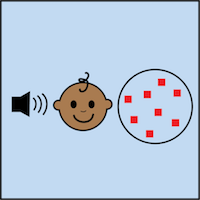
Which is More?
Infant and Child Cognition Lab (Boston College)
Who Can Participate |
For babies ages 5 to 9 months who reside in the US. Each participant can only participate in this study once. |
What Happens |
During the study, your baby will sit on your lap or a high chair and watch short movies with sounds. First, your baby will see movies that pair short sounds with small numbers of squares, and play longer sounds while showing a larger number of squares. Once your baby has seen a lot of videos that suggest “longer sounds means more squares” we will have a second set of videos. Now, longer sounds might mean “more squares” or it might mean “larger squares”. We will see how long your baby looks at the movies. |
What We're Studying |
This study investigates babies’ preferences to attend to numerical information when learning a new rule. In the first movie your infant will watch, your infant will see sets of squares of different sizes paired with a short or a long tone. During this movie, your infant will likely learn the rule that longer = ‘more’. But what do infants think ‘more’ means? While some researchers think babies are really tuned to the number of items they see, others have argued that infants have difficulty attending to number, and instead prefer to focus on basic perceptual variables, like the amount of red on the screen. We are interested in whether infants learn the rule that longer tones go with a greater number of items, or that longer tones go with a greater amount of red in order to learn what quantities are most salient to infants. |
Duration |
10 minutes |
Compensation |
Within a week after you participate in this study, we will email you a $5 Amazon.com gift card which you can redeem at amazon.com. To be eligible for the gift card: 1) your child must be in the age range for this study, 2) you need to submit a valid consent statement, and 3) we need to see that there is a child with you. You and your child do not need to finish the whole study to receive the gift card; however, if this is the case, please let the researchers know so that you can receive your compensation. |
This study is conducted by Sara Cordes (contact: bccognition@bc.edu).